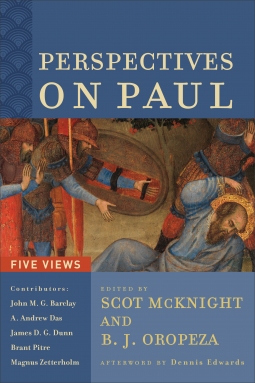
Perspectives on Paul
Five Views
by Scot McKnight, B. J. Oropeza
This title was previously available on NetGalley and is now archived.
Send NetGalley books directly to your Kindle or Kindle app
1
To read on a Kindle or Kindle app, please add kindle@netgalley.com as an approved email address to receive files in your Amazon account. Click here for step-by-step instructions.
2
Also find your Kindle email address within your Amazon account, and enter it here.
Pub Date Oct 27 2020 | Archive Date Dec 04 2020
Baker Academic & Brazos Press | Baker Academic
Talking about this book? Use #PerspectivesonPaul #NetGalley. More hashtag tips!
Description
Advance Praise
“Three Protestant Pauls, a Catholic Paul, and a Jewish Paul all walk into one volume—and collegial colloquy ensues. The scholars assembled here communicate the key issues, arguments, and interpretations that currently shape our highly charged moment in Pauline studies. Perspectives on Paul makes and marks an energetic contribution to important developing conversations.”—Paula Fredriksen, The Hebrew University, Jerusalem
“To have a summary of scholarship on Pauline theology is good. To have the experts speak for themselves is better. But to have back-and-forth conversation among experts, such as we find in Perspectives on Paul, is a gift. If you find yourself confused about or behind on the study of Paul, look no further. I found the thoughtful engagement in this book very insightful.”—Nijay K. Gupta, professor of New Testament, Northern Seminary
“For many readers, Paul is perplexing—there is the New Perspective, the Old Perspective, and a variety of other perspectives. McKnight and Oropeza have provided a much needed and highly accessible summary of the way E. P. Sanders’s Paul and Palestinian Judaism has impacted Pauline scholarship in the last forty years. This volume, with five different approaches to reading Paul, offers a one-stop shop for those desiring to understand the dominant perspectives in conversation with other prominent and influential voices.”—Jeanette Hagen Pifer, assistant professor of New Testament, Talbot School of Theology, Biola University
Available Editions
| EDITION | Other Format |
| ISBN | 9781540960757 |
| PRICE | $30.00 (USD) |
| PAGES | 304 |
Average rating from 1 member
Featured Reviews
Summary: Presents five perspectives on the ministry and message of Paul: the Catholic, traditional Protestant, the “New Perspective” pioneered by E.P. Sanders, the Paul within Judaism perspective, and the Gift perspective.
Beginning with the work of E. P. Sanders and those who followed him, there has been an explosion of Pauline scholarship, often some version of “perspective” on Paul. The editors of this volume offer a brief overview of the recent scholarship in introducing the five perspectives in this volume:
1. The Roman Catholic Perspective. Brad Pitre, affirming the New Perspective contribution to understanding Second Temple Judaism’s covenantal nomism, contends that the Catholic view of faith and works has strong resonances with the New Perspective, which for him is not that new.
2. The Protestant Perspective. A. Andrew Das sets forth the traditional Protestant perspective on justification by grace alone with works as a response to being saved. He also recognizes that the New Perspective gives the lie to stereotypic faith vs. work caricatures.
3. The New Perspective. James D. G. Dunn offers a restatement of the New Perspective, valuable because it may be one of the last pieces of writing from this scholar before his death in June of 2020, particularly affirming Paul’s theology of justification that crossed cultural boundaries.
4. Paul within Judaism. This perspective, discussed by Magnus Zetterholm, takes the Second Temple Judaism of Paul further and insists that Paul never left Judaism or its practices, while teaching non-Jews to live consistently with Judaism while respecting their Gentile identity.
5. The Gift Perspective. John Barclay contributes perhaps the newest perspective, one that sees the gift of Christ, his grace as making sense of the promises to Abraham, the experience of the Spirit, and the oneness of God.
Each of the contributors respond to others with a concluding response from each contributor. What is striking (perhaps apart from A. Andrew Das’ response to the Catholic perspective), was that this wasn’t one versus the others, but each in conversation with the others. It was striking the widely shared consensus on the New Perspective, particularly in its shattering of stereotypes of Judaism that lead to anti-Semitism. More clearly we see the Paul who is a product of second temple Judaism as well as apostle to the Gentiles. James D. G. Dunn candidly admitted his lack of reading of the early fathers in conversation with Brad Pitre. In addition to the irenic character of the conversation, one sensed a convergence of perspectives. Not that there was total agreement, particularly in the nuances. But one had the sense of scholars at different vantage points considering the same object, Paul, and gaining a fuller perspective from the perspectives of each.
This, to me, represented the best of theologians from different perspectives in conversation. In addition, between the editors’ introduction and the interactions around each perspective, this book is a good introduction to recent Pauline scholarship in a single volume, drawing upon the very best from each perspective. Dennis Edwards adds a concluding essay considering the pastoral relevance of the discussion. This is one of the very best “perspectives” books I’ve encountered.
________________________________
Disclosure of Material Connection: I received a complimentary review copy of this book from the publisher via Netgalley. The opinions I have expressed are my own.



